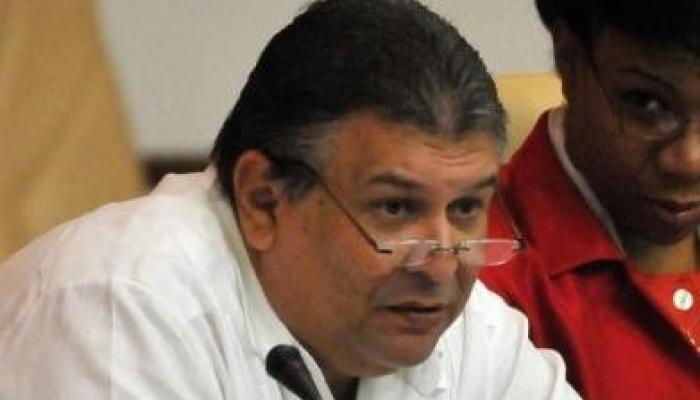Cuban Economy Keeps Improving Despite US Blockade
Cuban economy will continue to improve despite the US blockade, foreign financial restrictions and the international situation, said Economy Minister Marino Murillo, as he submitted the 2015 Economic Plan at a meeting of the Council of Ministers presided over by President Raul Castro last Friday.
A report on local Granma newspaper explains that the plan aims at boosting efficiency, encourage the performance of key economic sectors, the growth of investment in production and infrastructure in particular and to maintain basic social services.
The country's GDP is estimated to reach 1.3% this year, below the expected 2.2%, but it could grow little over 4% in 2015 with major results in the manufacturing industry, construction, trade, agriculture, ranching and forestry, the minister said.
As to food imports, the country plans to increase by 137 million dollars the budget dedicated to purchasing foodstuffs at the international market, which sets the figure at 2.1 billion, particularly in staples like soybeans, potato seeds, wheat and flour.
Investment will increase to 7 billion 159 million dollars, over a total of 1 billion 595 million in 2014, the minister explained and went on to say that by the end of this year employment will keep at 2% over the expected figure thanks to the growing non-state sector, and the average salary will also grow 9.1% following increases in the areas of health and sports, and foreign investment projects over the past quarter of the year.
The non-state sector will continue to grow next year, particularly due to the transfer of catering and other services to private management modalities.
The most important issue this year has been paving the way for the elimination of the dual currency, said Marino Murillo, who referred to the expansion of purchase in the two currencies at hard-currency retail shops throughout the country.
The minister also said that by late September over 476 thousand citizens had joined self-employment.
Cuba and China to Cooperate in Public, Business Management
Representatives of Cuba and China recently signed a memorandum of understanding to develop collaboration in the field of public administration and corporation management.
With the official signing of such a mechanism, the cooperation ties between the Cadre School of the State and Government of this country, and the Chinese Academy of Governance.
Cuba signed the memorandum through the rector of the Cadre School of the State and the Government, Mercedes Delgado; while China was represented by the Secretary of the Party Committee in the Academy of Governance and vice-rector, Chen Baosheng.
This instrument is an important fact to bilateral relations and provides an excellent opportunity to promote the academic exchange and the preparation of our cadres, Delgado said.
According to Mercedes Delgado, this is the first time Cuba establishes a memorandum of understanding for collaboration in the area of public administration and corporation management.
For his part, Jorge Luis Guerrero, head of the Directorate of Cadres of the State and the Government in Cuba pointed out that the mechanism will contribute to the implementation of the guidelines for the economic and social policy of the island.
Cuba and Argentina Signed Scientific Cooperation Agreements
Argentina's CONICET (National Scientific and Technical Research Council) and Cuba's CIGB (Center for Genetic Engineering and Biotechnology) agreed on the building of a center for the development and research of biotechnological medicines.
The facility will be named Ernesto “Che” Guevara, and according to CIGB General Director, Luis Herrera Martinez, it is part of the “advanced stage” of academic cooperation which will allow the emergence of “new and beneficial products” for both countries.
CONICET's chairman, Roberto Carlos Salvarezza, highlighted that the first cooperation agreements were signed by both institutions in 2009, while 4 projects are nowadays being implemented, one of them linked to the fight against cancer.
Both institutions recently signed agreements to work together in the fields of nanomaterials and the synthesis of new molecules to make better use of CIGB competence to start new researches.
Cuba’s advances in nanotechnology has allowed the country to develop new methods to create new diagnosis systems, vaccines, and drugs to fight cancer, B and C hepatitis as well as the diabetic foot ulceration.
According to the estimates of BioCubaFarma (Biotechnology Pharmaceutical Industry Group) announced last year, the exports of this branch will rise to the 5 millions USD in the next 5 years.
Cuba Tests New Biodiesel Fuels to Reduce Oil Import Dependence
Experts are trying new biodiesel fuels for motors, according to Pedro Rodriguez, doctor in Science from Cuba's Higher Polytechnic University, Jose Antonio Echeverria, (CUJAE).
Rodriguez said he and his colleagues have been undertaking researches with different types of biomass, in order to extract oil and use it mixed with other fuels.
The target is to improve the energetic matrix of the Caribbean island through sustainable and environment-friendly fuels, Rodriguez was quoted by Prensa Latina official local agency.
Rodriguez participated in the 17th Scientific Convention on Engineering and Architecture, recently concluded at the Havana's Convention Palace, which discussed over 1,440 investigations from Cuban and foreign experts, mainly addressed to the issues of energy, environment, new technologies, biotechnologies and food, among other topics.
Cuba produces about 4 million tons of oils with its accompanying gas in a year, but that figure covers only 50% of its domestic needs and the rest is imported, with payment facilities, from its main political ally, Venezuela.
The government is promoting strategies to reduce its dependence from oil imports while developing natural energy sources more favorable to nature and atmosphere.


